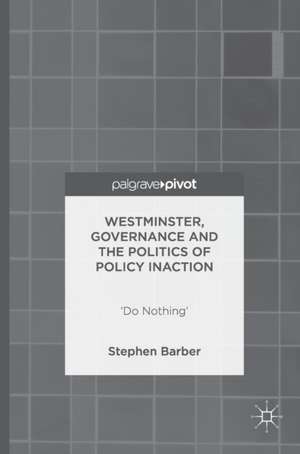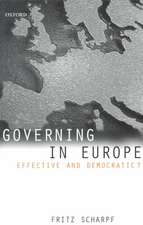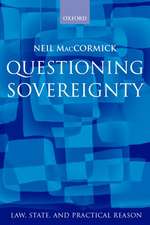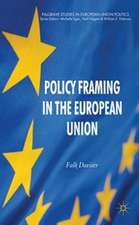Westminster, Governance and the Politics of Policy Inaction: ‘Do Nothing’
Autor Stephen Barberen Limba Engleză Hardback – 6 dec 2016
Preț: 415.57 lei
Nou
Puncte Express: 623
Preț estimativ în valută:
79.52€ • 83.02$ • 65.81£
79.52€ • 83.02$ • 65.81£
Carte tipărită la comandă
Livrare economică 04-18 aprilie
Preluare comenzi: 021 569.72.76
Specificații
ISBN-13: 9781137487056
ISBN-10: 1137487054
Pagini: 150
Ilustrații: IX, 97 p. 1 illus. in color.
Dimensiuni: 148 x 210 x 8 mm
Greutate: 0.28 kg
Ediția:1st ed. 2017
Editura: Palgrave Macmillan UK
Colecția Palgrave Pivot
Locul publicării:London, United Kingdom
ISBN-10: 1137487054
Pagini: 150
Ilustrații: IX, 97 p. 1 illus. in color.
Dimensiuni: 148 x 210 x 8 mm
Greutate: 0.28 kg
Ediția:1st ed. 2017
Editura: Palgrave Macmillan UK
Colecția Palgrave Pivot
Locul publicării:London, United Kingdom
Cuprins
Introduction: A Systemic Problem for Westminster Government.- Chapter 1. Why Do Nothing and Who Does It?.- Chapter 2. Why Does ‘Do Nothing’ Politics Matter?.- Chapter 3. How is ‘Do Nothing’ Politics held to account?.
Notă biografică
Stephen Barber is Associate Professor in Public Policy at London South Bank University, UK, where he teaches on its leading Masters in Public Administration programme and a Senior Research Fellow at the Global Policy Institute. A frequent media commentator, he has published five previous books and numerous scholarly articles.
Textul de pe ultima copertă
This book shows how political inaction has shaped the politics, economy and society we recognize today, despite the fact that policymakers are incentivised to act and to be seen to act decisively. Politicians make decisions which affect our lives every day but in our combative Westminster system, are usually only held to account for those which change something. But what about decisions to do nothing? What about policy which is discarded in favour of an alternative? What about opposition for naked political advantage? This book argues that not only is policy inaction an overlooked part of British politics but also that it is just as important as active policy and can have just as significant an impact on society. Addressing the topic for perhaps the first time, it offers a provocative analysis of ‘do nothing’ politics. It shows why politicians are rarely incentivized to do nothing, preferring hyperactivity. It explores the philosophical and structural drivers of inaction when it happens and highlights the contradictions in behavior. It explains why Attlee and Thatcher enjoyed lasting policy legacies to this day, and considers the nature of opposition and the challenge of holding ‘do nothing’ policy decisions to account.
Stephen Barber is Associate Professor in Public Policy at London South Bank University, UK, where he teaches on its leading Masters in Public Administration programme and a Senior Research Fellow at the Global Policy Institute. A frequent media commentator, he has published five previous books and numerous scholarly articles.
Caracteristici
Examines ‘do nothing’ politics for the first time, setting it in the context of British government policy making Comments on the nature of parliamentary opposition to ask how ‘do nothing’ policies can be held to account Shows how deciding to do nothing can be the most significant policy of all, and considers future challenges for ‘do nothing’ politicians


















